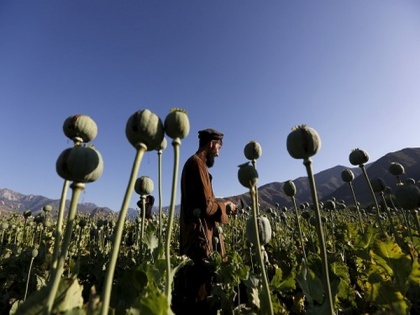Poppy cultivation in Afghanistan banned since the Emirate's establishment: Taliban
By ANI | Published: December 26, 2022 03:01 PM2022-12-26T15:01:34+5:302022-12-26T20:35:18+5:30
Afghanistan's Ministry of Interior under the caretaker Taliban regime reported that poppy cultivation has been banned nationwide since the ...

Poppy cultivation in Afghanistan banned since the Emirate's establishment: Taliban
Afghanistan's Ministry of Interior under the caretaker Taliban regime reported that poppy cultivation has been banned nationwide since the establishment of the Islamic Emirate and that no one is allowed to farm poppy on their lands, according to Tolo News.
Nafi Takor, the spokesman for the ministry, said that preventing the cultivation of poppy is part of the Taliban's counter-narcotics campaign.
"The Ministry of Interior has been fighting in the field of poppy cultivation and trafficking for a year and the fight will continue to avoid this bad phenomenon," he said, as quoted by Tolo News.
Following the Taliban decree, some farmers said that cotton production is a good alternative to poppy cultivation. The farmers asked for the Taliban's assistance in this regard.
Raz Mohammad, a farmer, as quoted by Tolo News, said: "Last year, farmers cultivated poppy but this year, they haven't."
"We started cotton cultivation when poppy farming was banned. Over the past 10 days, the price of cotton has dropped from 1,000 Afs to 800 Afs," said Mohammad.
Analysts, however, say that poppy cultivation is still underway in Afghanistan and that the Taliban should stop it.
The United Nations earlier reported that 85 per cent of the world's opium is being produced in Afghanistan.
A recent report by Khaama Press said the drug trade in Afghanistan has boomed under the Taliban.
The Taliban after taking power in Afghanistan in August 2021, promised to crack down on narcotics and ban the production, processing, and sale of illicit drugs. The Taliban issued a decree to ban the production and sale of illicit drugs. They, however, failed in their implementation. Afghanistan's drug trade, thus, started flourishing under the Taliban regime, according to Khaama Press.
After the Taliban took control of Afghanistan, the country's economy crashed and unemployment skyrocketed. Citizens started to struggle to live a normal life. Many people who were employed by the previous government, lost their jobs and struggled to meet their daily needs. Amidst adversities, many migrated to neighbouring countries such as Iran, Pakistan, and Turkey.
"My husband was an addict, he convinced me to take drugs. He died some time ago, and I joined a group of addicts for I had no place to live and none of my relatives would accept me," a female drug addict was quoted as saying by Sky News.
"Considering the dire economic and humanitarian crisis in the country, it is beyond the de facto regimes' capacity to come up with a comprehensive strategy to deal with the drug problem. According to the existing reports, hundreds of families earn their income from drug cultivation and processing," reported Khaama Press.
( With inputs from ANI )
Disclaimer: This post has been auto-published from an agency feed without any modifications to the text and has not been reviewed by an editor
Open in app